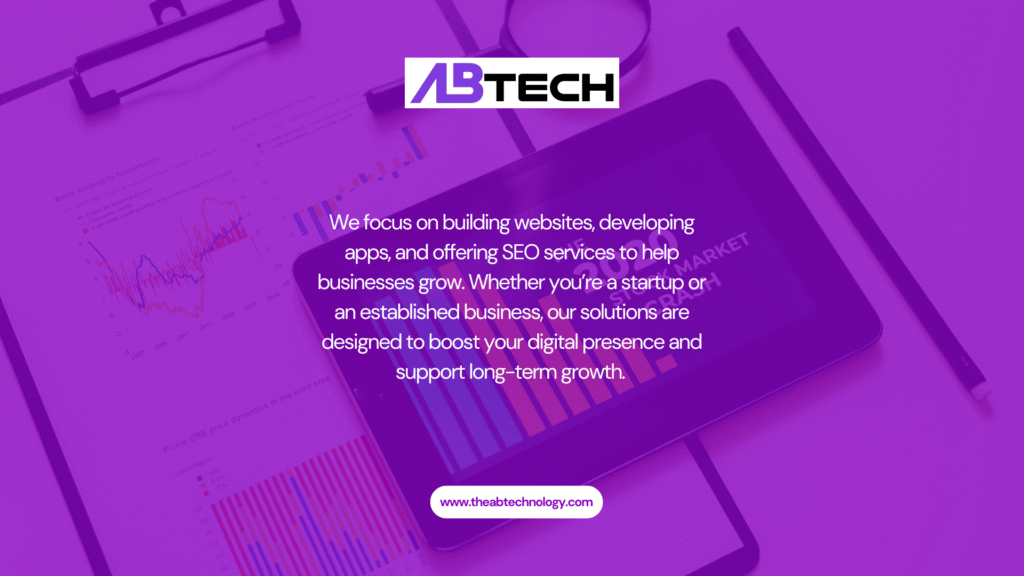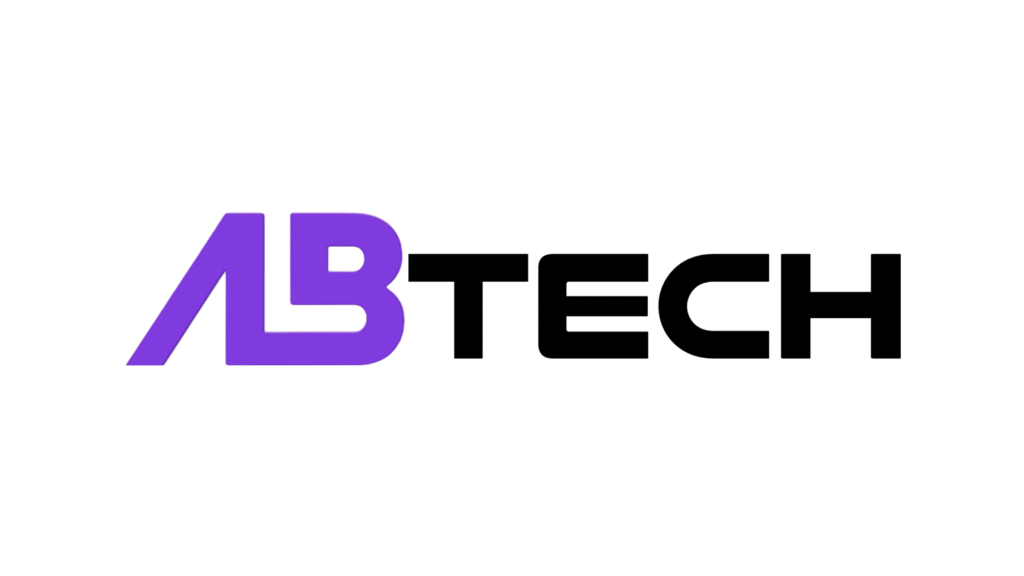What is Technology Marketing and Why Does It Matter
Technology marketing blends the power of digital tools with strategic thinking to reach, engage, and convert customers in an ever-evolving digital world. It’s not just for tech companies. Every brand today uses technology to enhance their campaigns, build customer relationships, and grow smarter with every interaction. As the marketing landscape becomes more data-driven and automated, understanding how technology fits into the picture is crucial for long-term success.
Understanding the Core of Technology Marketing
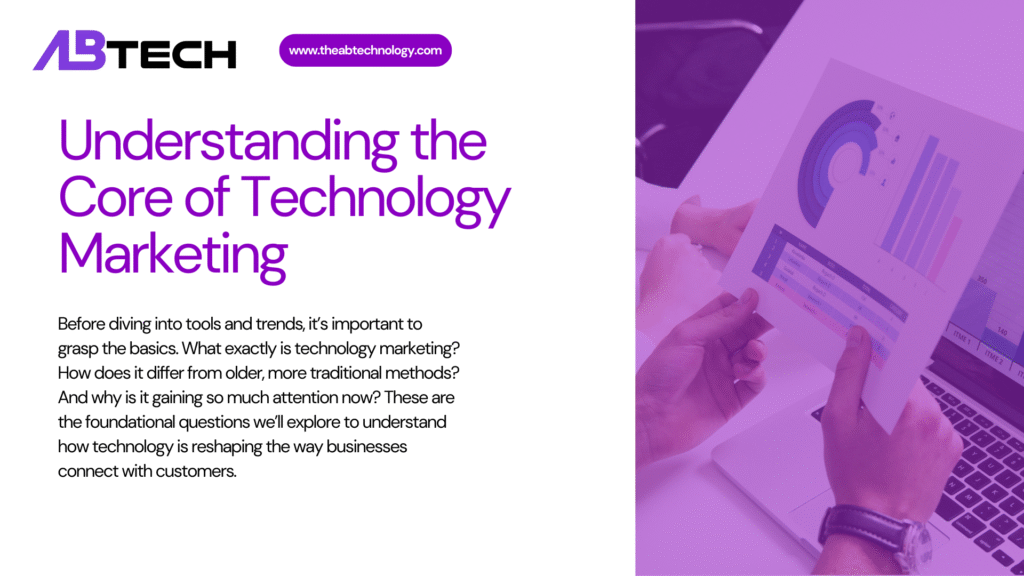
Before diving into tools and trends, it’s important to grasp the basics. What exactly is technology marketing? How does it differ from older, more traditional methods? And why is it gaining so much attention now? These are the foundational questions we’ll explore to understand how technology is reshaping the way businesses connect with customers.
The Definition of Technology Marketing
Technology marketing refers to the use of digital tools, platforms, and systems to support and drive marketing efforts. This includes everything from social media scheduling tools and customer relationship management systems to complex data analytics platforms. Whether you’re promoting a SaaS product or running a retail business, technology marketing helps you better understand your audience, streamline campaigns, and improve results.
How It Differs From Traditional Marketing
While traditional marketing focuses on channels like newspapers, billboards, and TV commercials, technology marketing leans into automation, interactivity, and real-time feedback. Traditional marketing often casts a wide net. Technology marketing, on the other hand, targets specific audiences with personalized messaging and tracks exactly how they respond. It’s measurable, adaptable, and scalable.
Why Tech Marketing Matters in Today’s Digital Economy
Today’s consumers are online. They scroll, search, compare, and buy using their phones and laptops. Without a tech-based marketing strategy, businesses risk falling behind. From paid search to email campaigns and AI-powered chatbots, technology allows companies to stay visible, relevant, and responsive in a crowded digital marketplace.
The Role of Technology in Shaping Modern Marketing
Technology is a driving force behind the development of plans and the execution of campaigns, not just a tool for marketing. From the way people shop to how brands interact with customers, digital tools continue to reshape the marketing landscape.
Evolution of Marketing With Technology
Marketing has come a long way from print flyers and cold calls. With each decade, new technology has reshaped the landscape. The rise of the internet, mobile phones, social media, and now AI has shifted marketing from one-size-fits-all to personalized and performance-driven. Marketers now rely on data and automation to scale campaigns, measure ROI, and iterate quickly.
Impact of Digital Tools on Consumer Behavior
Digital tools have empowered consumers. They can research products in seconds, read reviews, compare prices, and get instant support. This shift has made trust and relevance more important than ever. Marketers must now deliver useful, tailored experiences to keep audiences interested and loyal.
How Automation and AI Are Influencing Marketing Strategies
Automation handles repetitive tasks like email follow-ups and ad placement. AI takes it further by analyzing customer data, predicting future behavior, and suggesting the best content or timing for outreach. Together, they reduce manual work and improve efficiency.
Examples From Leading Tech Companies
Netflix uses AI to suggest what you’ll watch next. Amazon personalizes your shopping experience based on your past behavior. These companies rely heavily on marketing technology to keep users engaged and coming back.
Data-Driven Personalization at Scale
With tech tools, brands can send personalized emails, display tailored ads, and suggest content based on what customers actually want. This approach boosts engagement and builds stronger customer relationships.
Types of Technologies Used in Marketing Today
Modern marketing depends on a wide range of technologies that help businesses connect with customers more effectively. From automation to analytics, these tools offer ways to save time, improve targeting, and increase overall performance.
Marketing Automation Tools
Automation tools save time and ensure consistency across campaigns.
- CRM Systems: Customer relationship management tools store contact details, track interactions, and help businesses nurture leads. Tools like Salesforce and HubSpot give a full view of the customer journey.
- Email Marketing Software: Platforms like Mailchimp and Brevo let you segment audiences, schedule emails, and analyze open rates. Automated workflows allow you to respond to customer actions instantly.
Artificial Intelligence and Machine Learning
These technologies process large amounts of data to deliver insights and improve personalization.
- Chatbots: Available 24/7, chatbots handle customer questions and guide users through purchases or support steps without human intervention.
- Predictive Analytics: Predictive tools help you forecast customer behavior, identify trends, and refine targeting strategies.
Search Engine Optimization Tools
Tools like Ahrefs and SEMrush help you research keywords, track rankings, audit your site, and uncover new content opportunities. They’re essential for improving visibility on search engines.
Social Media and Content Marketing Platforms
Tools like Buffer, Canva, and Hootsuite streamline content creation, publishing, and analytics. They help maintain consistency and monitor performance across platforms like Instagram, LinkedIn, and X.
Customer Data Platforms and Analytics Dashboards
Platforms like Segment and Google Analytics organize customer data across touchpoints. Dashboards give you a real-time view of your marketing performance, helping you optimize as you go.
What is Marketing Technology and How Does It Support Strategy
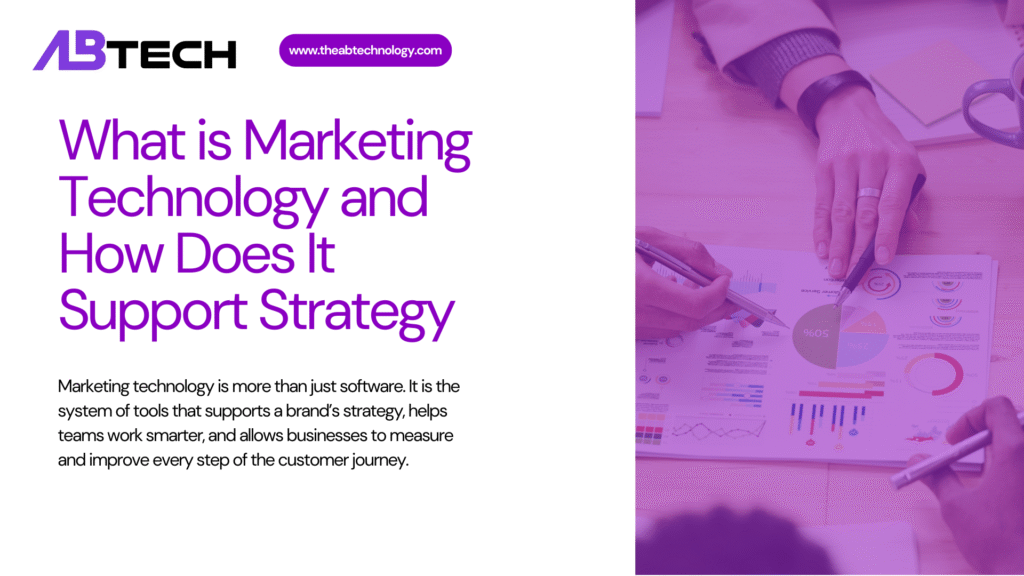
Marketing technology is more than just software. It is the system of tools that supports a brand’s strategy, helps teams work smarter, and allows businesses to measure and improve every step of the customer journey.
Defining Martech and Its Ecosystem
Marketing technology, often called martech, refers to the collection of digital tools used to execute, manage, and measure marketing efforts. The martech ecosystem is vast and includes everything from email platforms to AI tools and customer data platforms.
How Martech Stacks Are Built
A martech stack is the combination of tools a company uses for different marketing functions. It’s built based on specific needs, such as lead generation, analytics, content management, and customer engagement. An effective stack is well-integrated and tailored to the company’s workflow.
Benefits of Using Marketing Technology in Campaigns
- Improved Targeting: With detailed customer data, you can reach the right people at the right time with the right message.
- Efficiency and ROI Tracking: Automation cuts down on manual work. Analytics tools track campaign performance so you can make informed decisions and adjust quickly.
- Personalized Content Delivery: With personalization tools, content feels more relevant to users, increasing engagement and conversion rates.
What is Digital Marketing Technology and How It Works
Digital marketing tools are everywhere, but knowing how to use them effectively is what makes the difference. This section explains how these tools connect to your business and how they help you stay visible and competitive online.
How Digital Marketing Tools Integrate With Core Business Systems
Digital marketing tools don’t work in isolation. They integrate with CRMs, e-commerce platforms, and data warehouses to provide a complete view of customer behavior. This integration allows businesses to deliver consistent experiences across channels.
Examples of Digital Marketing Technologies in Action
- Google Ads and Programmatic Advertising: These platforms help businesses target users based on location, interests, and behavior. Programmatic ads use automation to buy and place ads in real time for better performance.
- Marketing via Mobile and Voice Assistants: From SMS campaigns to voice searches on Alexa and Siri, businesses are adapting to new ways people interact with technology.
How to Choose the Right Digital Tools for Your Brand
Consider your business goals, budget, and technical skills. Focus on tools that integrate well with your existing systems and can grow with your business.
How Technology is Used in Product Marketing
Technology plays a key role in launching, positioning, and promoting products. It helps businesses use data more effectively, reach the right audience, and adjust strategies based on real-time feedback.
Using Data to Guide Product Positioning
Analytics tools show what customers care about, which features they value, and how they interact with your product. This helps shape messaging and positioning strategies.
Leveraging Tech for Product Launches and Awareness
Email sequences, targeted ads, influencer campaigns, and launch-specific landing pages all rely on marketing tech to ensure a smooth rollout.
Technology in Competitive Analysis and Trend Monitoring
Tools like Google Trends, BuzzSumo, and Similarweb help monitor competitors, discover emerging trends, and adjust your strategy accordingly.
Examples of Marketing Technology in the Real World
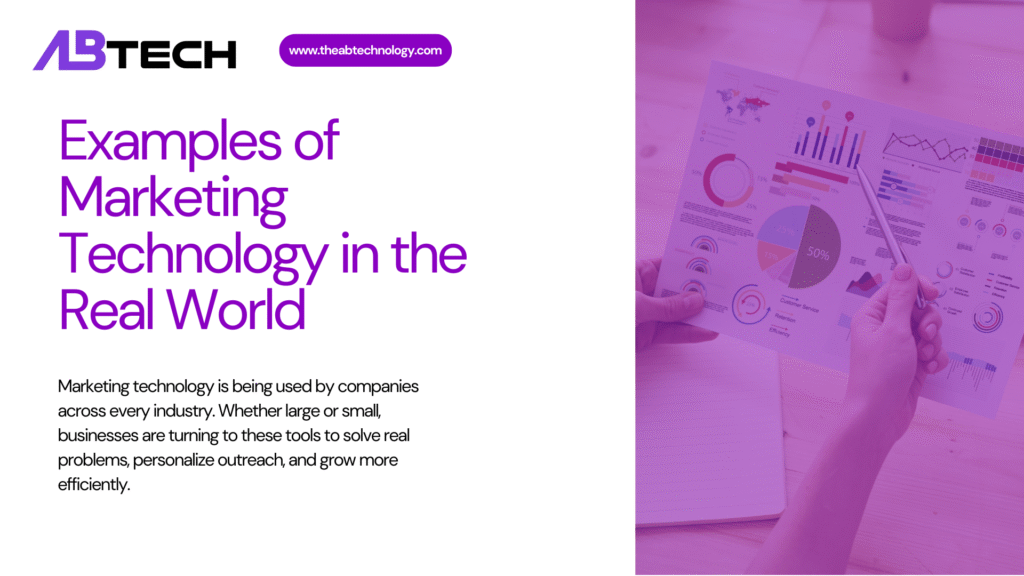
Marketing technology is being used by companies across every industry. Whether large or small, businesses are turning to these tools to solve real problems, personalize outreach, and grow more efficiently.
Successful B2B Martech Case Studies
Companies like Adobe and Salesforce use martech stacks to nurture leads, personalize outreach, and track engagement across long B2B sales cycles.
How Startups Use Technology to Scale Their Marketing
Startups use affordable tools like Zapier, MailerLite, and Notion to build nimble systems. They automate what they can and measure every move to stretch resources.
What Large Enterprises Are Doing Differently With Martech
Enterprises often invest in custom-built stacks, advanced AI tools, and omnichannel strategies. They have the scale and budget to test cutting-edge technologies before others do.
The Future of Marketing in a Tech-Driven World
Marketing is moving fast as technology continues to evolve. From artificial intelligence to new digital platforms, this section looks at the trends that are shaping the future and how marketers can stay prepared for what comes next.
Trends Shaping the Next Decade
Expect to see more AI-powered content creation, immersive experiences using AR and VR, and tools that allow marketers to act on data instantly.
Privacy Concerns and Ethical Use of Marketing Tech
With increasing regulations like GDPR and growing consumer awareness, brands must use data responsibly. Transparency, consent, and security will be key trust factors.
How Marketers Can Stay Ahead in a Fast-Changing Environment
Stay curious. Learn new tools, test new platforms, and focus on strategy over trends. Successful marketers combine creativity with data to lead, not follow.
